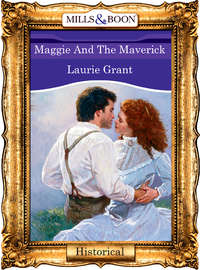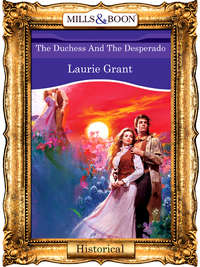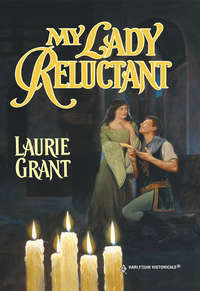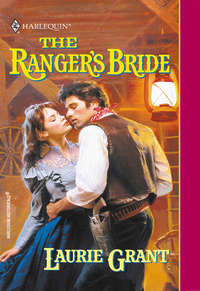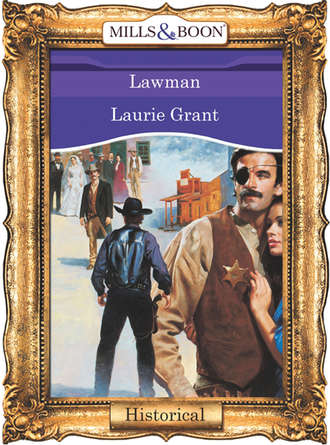
Полная версия
Lawman
He’d think about Lizabeth, the woman who’d taken him in when he’d finally fallen off his horse at her isolated farmhouse, wounded, shivering with fever and having no idea of who he was. Even though he’d been wearing a blue uniform in the midst of rebel territory, Lizabeth had hidden him and nursed him until he was well. When he’d gotten better he’d just never gotten around to leaving. He didn’t know what regiment to return to anyway.
Eventually love had grown between him and the widowed Lizabeth and he had married her, only to lose her to pneumonia later. From there he’d drifted on to Abilene, where Sam had found him tending bar as “Deacon Paxton.”
Yes, Cal would think of Lizabeth. Now there had been a good woman, a trustworthy woman. As he lay in the comforting darkness of the bedroom, waiting for the laudanum to take effect, he tried to remember her face. She’d been a blonde, her hair a reddish-gold shade she called strawberry. She’d had big green eyes and a determined chin…but somehow, every time he tried to picture her, Livy’s face intruded instead.
Walking up the steps of the Bryan Episcopal Church was like coming home. Built of freestone in hues of mellow gold and gray, the exterior of the building was in harmony with the golden autumn morning.
Entering the sanctuary through the short narthex, Cal lifted his eyes with pleasure to the stained-glass window behind the altar, which portrayed Jesus as the Good Shepherd, surrounded by sheep and tenderly holding a lamb. It had been purchased at some considerable sacrifice by the parishioners when the church was still newly built, a couple of years before the war, and Cal, just ordained, had taken over as the rector. That window reminded him of why he wanted to minister to God’s people. He’d often write his sermons while sitting in the front pew, looking up at that window for inspiration.
“So it’s true—you’re back. What are you doing here?” demanded a raspy voice behind him.
Cal knew who it was before he turned around. “Hello, Josiah,” he said, extending his hand as he faced the man who’d taken his place as rector. “Yes, I’m back, and not dead after all, it seems.” He smiled pleasantly at the portly man, who was five years his senior. “It’s nice to be home.”
Josiah Maxwell just breathed heavily, his dark eyes suspicious. “I said, what’re you doing here?” He jerked his head around to indicate that he meant the interior of the church.
Cal sighed inwardly. So Maxwell wasn’t going to make it easy. “Why, I just came to look at my favorite picture. It sustained me, thinking about that picture during the war. I even remembered it after the shell hit—” he gestured toward his patch and the scars “—and I couldn’t remember anything else. I just couldn’t remember where I’d seen it.”
He knew as soon as he’d said it that mentioning the war had been the wrong thing to do. It gave Maxwell an excuse to object to him sooner.
“You mean when you were wearing a blue coat and killing other Texas boys?” Maxwell asked with a sneer.
Cal took a deep breath. If he’d thought his appearance would appeal to Maxwell’s sense of compassion, he’d been deluding himself. “Josiah, that’s all over now. It’s been over for three years. I’d hoped by now folks would be willing to let bygones be bygones, and live for today and the future, not dwell in the past, however tragic it’s been for all of us. I—I’d even hoped maybe you might have some work for me to do to help you here.”
Maxwell’s flush had risen up his neck, past his muttonchop-whiskered jowls to the top of his thinning brown hair.
“Work? For you? I’m the rector here—I don’t need any help.”
“I know you’re the rector, Josiah,” Cal said patiently. “I’m not trying to take your place, merely to offer assistance. I’d be happy to do anything, as a deacon or in whatever capacity you’d like. When I left, this place was crying out for an assistant rector.”
Maxwell’s arms folded over his ample belly. “I got nothing for you to do here,” he insisted. “I reckon I’d sooner work with the devil himself.”
“You wouldn’t consider consulting the vestry first, before giving me your final answer?” Cal asked, referring to the lay governing board of the church. “I’m willing to wait until they can meet.”
“I’ll just bet you are,” said Maxwell with an ugly laugh. “You waited three years after the war was over to come home, didn’t you? I guess that makes you a patient man. But the vestry isn’t going to vote any different, so you may as well forget it.”
Cal thought about explaining his loss of memory, then dismissed the idea. Chances were Maxwell had already heard that part, too, and didn’t believe it. “I’m sorry to hear that,” Cal made himself say in a calm tone. “Well, I’ll see you on Sunday, then, Josiah.”
“I wouldn’t bother, if I were you. Folks see you come in, they’re apt to leave. They don’t hold with worshippin’ alongside a’ traitors.”
Cal just stared at him for a moment before turning on his heel to go. Back in the narthex, he encountered a drawn, haggard woman dressed in mourning black, who looked faintly familiar.
“Good mornin’, ma’am. Aren’t you Miss Lucy Snow? Cal Devlin,” he explained, when the woman just stared, gaping, at his eye patch. “It’s nice to see you again,” he said politely, while thinking inwardly that Annie had spoken the truth when she’d said Lucy was a wrinkled-up prune.
The woman’s blank stare turned to narrow-eyed outrage. “Don’t you even speak to me, you blue-bellied devil!” she snarled, and swept on past him with a swish of black bombazine.
So he wasn’t even welcome in his own church, he thought. Perhaps it was just a matter of time, of being patient while people he’d ministered to learned to trust him all over again. Perhaps he’d have to work on the Devlin farm for a spell, training and selling horses with Sam. Cal liked horses well enough, he guessed, and Sam would welcome his help, though he didn’t actually need it. But even as Cal considered the appealing prospect he knew it wasn’t for him. He wanted something of his own to do.
He mounted Goliad outside the stone church and headed down to the post office. He’d promised Mercy he’d see if there was a letter from Abilene from her father, the Reverend Fairweather. And Annie wanted some yellow thread from the mercantile. Now there were two good places to determine if his reception at the church was going to be typical of the whole town.
The post office was just a small frame building, hardly big enough for the clerk and three chattering ladies who occupied it, two of whom were enormously fat and identical in all respects, including the number of chins they possessed. The Goodlet twins? Sam had told him back in Abilene how the twins were no longer the buxom charmers who’d once competed for his attention.
Conversation ceased as he entered the post office. “Good morning, ladies,” he said, bowing before stepping up to the counter, where the clerk favored him with a basilisk glare.
The third woman put a net-gloved hand up to her mouth as if Beelzebub had just spoken to her.
“Well, I never,” murmured one of the twins.
“The nerve of some people!” sputtered the other, setting her chins wagging.
Cal smiled grimly at the Wanted poster on the wall, suppressing the urge to ask Leticia what she’d “never” and Alicia whether she meant he’d had a lot of nerve not to be dead.
“What do you want, mister?” demanded the goggle-eyed clerk, his Adam’s apple bobbing up and down. It was as if he hadn’t been the prize pupil in Cal’s catechism class before the war.
‘’Nothing much,” he said pleasantly. “Just wanted to see if my sister-in-law, Mercy Devlin, had any mail waiting.”
The clerk looked through a stack of letters. “Yup. Here,” he said, shoving one of them across the counter at him, then staring pointedly toward the door.
Cal took the hint, feeling the women’s eyes on him all the way out the door and hearing the buzz of talk begin once he was safely out of the building. On to the mercantile, then. Since it was just three short blocks, he left Goliad tied to the post-office hitching post.
He passed the Bonny Blue Flag Saloon, remembering that it had been merely the Bryan Saloon before the war. He was thirsty, but kept on walking. Maybe he’d stop in after he was done with his errand. Stepping off the plank sidewalk and into the dusty street to allow two more ladies to pass, he tipped his hat, but they merely stuck their noses in the air and sailed on, their bustles sending their skirts billowing in their wakes.
Sitting on a weathered bench outside the Bryan Mercantile and Emporium was a trio of idlers.
“Well, if it ain’t the prodigal son, returned from the dead,” began one, whom Cal recognized as the livery owner, a man who had never darkened the door of the Episcopal church, nor, it was well known, of the Baptist church, either.
“Eww, I thought I smelled something” jeered another man, stopping his whittling to eye Cal.
“You did, Asa. A no-good skunk,” the third man chimed in.
“Good day, gentlemen,” Cal said evenly, and went on in. He heard the creak of the boardwalk as they rose to follow him. Apparently he wasn’t even going to be allowed to purchase Annie’s thread in peace.
As his sight adjusted to the dim interior of the mercantile, he noticed a pair of ladies studying a bolt of blue calico. He nodded to them, hearing one of them gasp as he turned toward the proprietor. The latter was standing behind the counter, favoring him with the glare Cal was now becoming all too familiar with.
“What do you want?” the man said.
“Just some yellow thread for my sister, Mr. Ames.”
“Yella? He wants yella thread, did you hear that, Asa? Ain’t that the appropriate color fer him t’buy?” chortled one of the idlers behind him.
“What kind of yellow, Devlin? We got two-three shades here,” the proprietor said, fishing around in a case and holding out several hanks of thread.
“Oh, I expect he’ll take coward yella!” the liveryman announced, before Cal could say anything.
Cal felt his temper fraying. He didn’t want to raise a ruckus, not in a store or in front of ladies, but he didn’t think this trio of no-goods was going to be content to let him go without one. He knew as a man of the cloth, even an unemployed one, he ought to just continue to ignore them, but he wasn’t sure how long he could. Turning his cheek had never been his strong suit.
“I’ll take that one,” he said, pointing at random to a hank of thread the color of the daffodils that came up in February here. He laid a five-cent piece on the counter, not even waiting to see if he had paid too much. He just wanted to get out of there before these idlers made him do something ugly in the confines of the store.
“Bill, I guess he’s too yella to say anythin’ to ya,” jeered Asa, just as Cal was turning around.
“No, I’m not,” he countered. “I’ve just been raised not to call you what you are in the presence of ladies,” he said, jerking his head in the direction of the two women, who were already shrinking back against the far wall, watching them.
They let him get all the way out of the store and halfway down the street before they challenged him again, but Cal could feel them following him, like a pack of wild dogs waiting for the right moment to attack. He kept walking, his head held high, his back straight. He had never been a coward, and he wasn’t now—he just thought the fight that was going to result was going to be so…useless.
He heard one of them clomp up onto the sidewalk and shout through the bat-wing doors of the Bonny Blue Flag, “Hey, boys, guess who’s back in town? Traitor Devlin, that’s who! Why don’t ya all come out fer a second and give him a rousin’ welcome like he deserves!”
Three or four cowboys heeded the summons and came running out.
Cal wasn’t armed, hadn’t thought it appropriate for a preacher to strap on a six-gun. That was both a blessing and a curse, for although no one could pull a gun on him fairly if he wasn’t armed, wearing one himself might have kept the beating he was about to receive to merely verbal abuse. But damnation, if he was going to receive some bruises he was going to mete out some, too.
“Hey, blue belly! Devlin! Reckon I’ll be the first t’show ya how welcome ya are here!”
Cal heard the thudding of the cowboy’s boot heels as he ran up from behind, intending to jump him, and met the man’s advance with his fist instead. He was pleased to see the cowboy fall like a rock, a crimson stream spurting from his nose.
So much for turning the other cheek. Lord, what he wouldn’t give to have Sam at his side right now. There’d still be a fight—likely it would have happened sooner, but it would have been a little less lopsided.
After that it was chaos, with the other six men all jumping him at once, fists flying, calling out to every loitering male within earshot to join them. Cal fought desperately, landing punches on every body part of anyone he could reach, and receiving curses and blows in return. A cacophony of noise filled the dusty air.
He never saw the blow that felled him, for it came from the right, on his blind side. All he knew was that suddenly the struggle was over and he was cloaked in a cloud of velvet black.
The woman just mounting the buckboard to begin her drive home had seen the scarred man with the eye patch go down and had wondered what he had done to incur the enmity of so many men at once. To say he was outnumbered in the situation was putting it mildly.
She knew what being the underdog felt like, right enough, and she hated the feeling. Still, she wasn’t inclined to intervene; she’d been on the receiving end of male wrath entirely too much lately.
Probably the man had done something to deserve the drubbing he was getting, like welshing on a poker debt or cheating another man on a horse trade, so she probably shouldn’t let it trouble her conscience. And yet… She paused, about to cluck “giddap” to the horse, when she heard one of the ruffians yell something about getting tar and feathers.
She wasn’t going to let that happen—wasn’t going to let her reluctance to confront any more angry males extend so far that she would meekly allow them to do such a barbarous, painful thing. Not while she had breath in her body. She had been unable to save Francisco, but perhaps she could help this man, at least until she could find out what he had done.
Setting the brake and securing the reins, she picked up her shotgun and aimed it into the air, letting go with one barrel. She hoped she wouldn’t have to use the other one. Then she pointed it at the stunned attackers, who were still bent over their unconscious quarry. The man who’d started to run to fetch the tar and feathers froze in his tracks.
“Y’all ought to be ashamed of yourselves, all of you pickin’ on one man!” she shouted in the sudden silence, jumping down from her buckboard and stalking over to the fallen man. “Go on, get out of here! I’m sure you got better things to be doin’!” She kept her shotgun aimed at the half-dozen men, who obediently backed away. A couple of them slipped back into the saloon.
“You know this man?” one of them asked.
She darted a glance at the crumpled form, but he was lying facedown. “No, but that doesn’t mean I’m going to let you bullies kill him. He was unarmed,” she said with a calmness she was far from feeling.
“Ma’am, I’m sure you mean well, and I shorely do honor yore sense a’ fair play,” one of them began with an ingratiating smile, “but I think you oughta know this here yella-bellied coward fought for the Yanks, and then hid out for the rest of the war.”
No, it couldn’t be…
“So?” she asked belligerently, not lowering the shotgun or letting herself think about who it was she was protecting.
“So we was jest treatin’ him like such traitors deserve t’be treated,” the dusty, sweaty ruffian answered. “So perhaps you oughta get back up on yer buckboard, ma’am, and ride on t’wherever you was goin’ and don’t worry yore purdy little head—”
Were they going to rush her and try to take away her shotgun? Was she going to have to shoot one of them to prove she meant what she said? Could she shoot one of them?
“You heard the lady,” said a voice from behind her. “Now get on outa here.”
Olivia Gillespie turned to see a man behind her, his Colt drawn and aimed at the four who still remained. He touched the brim of his hat to her, then his eyes went back to the other men.
There was a long silence as they eyed each other, and finally the liveryman said, “Well, all right, Devlin, we’ll let him go this time. But mebbe ya better tell yore brother we don’t like his kind in Bryan no more.”
“I reckon you’ve more than made your point,” retorted Sam Devlin, with a meaningful glance at his brother’s still form. “But if you ever lay a hand on him again it’s gonna be you lyin’ there, not my brother. Now get on outa here, like I said before.”
He watched the four until they had slunk into the saloon, then turned back to Livy.
“Miz Gillespie, I’m much obliged,” he said as he walked over to see to his brother. She watched as he gently turned him over onto his back, and winced as she heard Cal groan.
If she hadn’t been told it was Caleb Devlin, she never would have been able to guess. The eye that wasn’t patched was rapidly swelling shut, and he was covered with scrapes and bruises. There was a laceration on his unscarred cheek that would likely make a new scar, and another over his lip. The hair she remembered as being black as a crow’s wing was now streaked with gray. The patch had been shoved out of place, and she gently pulled it back in place over the closed lid.
“Cal, it’s all right. They’re gone now,” the younger Devlin said softly, but the injured man didn’t react further. He was still unconscious.
“It’s a good thing you came along,” she said, glancing briefly at the tall, dark-haired cowboy, who looked like a younger version of Cal. “I’m not sure I could’ve held them off forever, even with old Betsy here,” she said, with a nod toward the ancient shotgun.
“Oh, they probably wouldn’t’ve had the gumption to try any thin’ else,” he said with a reassuring grin. “They’re just braggarts and bullies. I had a feelin’ that things might not go right the first time my brother showed his face in Bryan, though, so I thought I’d better check and see how it was goin’. Looks like I shoulda come a mite sooner.”
She didn’t want to add to his self-reproach, and so she changed the subject. “You’re Sam, aren’t you? Last time I saw you you were just a skinny boy flirting with the little girls at the annual church picnic on the river.”
Sam smiled. “I reckon I’ve grown a little since then. Now, I think I spotted Cal’s horse down the street a piece. If you could just wait with my brother, I’ll bring him up, but I reckon my Buck would mind less than his stallion about carryin’ Cal home over his saddle,” he said, nodding toward the placid buckskin gelding that stood at the hitching post, switching at flies with his black tail.
“Nonsense,” replied Livy. “There’s no need to do that when I’ve got my buckboard. I’ll help you load him onto the bed of my wagon, and you can tie his horse on the back.”
Chapter Three
Cal woke to the bite of a needle piercing his cheek. “Ow! Damnation! What do you think you’re you doing, Annie?” he growled, opening his eye as far as the swelling would allow. His sister was poised over him with a needle and black thread.
“Land sakes, Cal, is that any way for a minister to talk? And I should think it would be obvious what I’m doing, though I’d hoped to finish this while you were still passed out,” Annie responded tartly. “I’m stitching up your cheek, brother dear. Now hold still while I do just one more.”
Cal set his teeth and gripped the edge of the table, trying his best to focus on his mother, whom he could see hovering anxiously behind Annie. Not a sound escaped his lips as the needle flashed past his eye and bit him twice, once on either side of the laceration. He felt the odd sensation of the thread tugging at his skin as Annie’s nimble fingers knotted the stitch and then snipped it with some sewing scissors she took from the table. “Now hold on, this is going to sting,” she cautioned, and dribbled whiskey from a bottle over the stitched cut.
The resultant fire on his cheek felt like a foretaste of hell. “Annie, who’d have thought you were so good at piling on the agony?” he groaned. “I already hurt right smart in muscles I didn’t even know I had.”
“You’re very welcome, I’m sure,” Annie retorted. “Maybe I should have just left you with another couple of scars after those no-accounts settled your hash in town.”
His head was pounding again, but he managed to say, “Thanks. I didn’t mean to sound ungrateful. How’d I get home, anyway?”
“In Olivia Gillespie’s buckboard. It was God’s own mercy she happened to be in town buying supplies and saw those men whaling on you just as they got the notion to get out the tar and feathers. She stopped them with a blast from her shotgun.”
“Livy Gillespie is the one who saved me?”
Annie nodded. “Her an’ Sam, who’d started feelin’ uneasy a little while after you rode away from here. Then she was kind enough to offer her buckboard to haul you home. You didn’t even rouse when Sam an’ one of the hands carried you upstairs an’ laid you in bed.”
“Is she—is she still here? I suppose I ought to thank her,” he said, his mind still reeling at the thought of his rescuer’s identity. He hated the idea of her seeing him like this, broken and battered. His face was probably more black-and-blue than white.
“No, she left as soon as we had you safely in bed,” said Annie, to his relief. “Said she had to get back to her farm before it got too late. Land sakes, but that’s one independent woman. She wouldn’t even hear of Sam riding along to make sure those rowdies wouldn’t bother her again when she went back through town— she just made sure her shotgun was loaded again.”
“How’d she…was she…” He couldn’t find the words to ask if she was still the prettiest girl in Brazos County.
“Is she showing yet, is that what you’re tryin’ to ask? No, I can’t really say she was, though she was wearing a wrapper, not a dress, and Lord knows a woman can hide a thick waist in one a’ those for a long while.”
“Oh.” His head ached too severely for him to hear any more about the intricacies of female garments. He wished Annie hadn’t mistaken his meaning, for in his astonishment at hearing that Olivia Gillespie had helped rescue him he had forgotten all about the scandal that clouded her name.
Cal closed his eyes, and Annie took the hint. He heard her chair scrape against the floorboard. “You get some rest now, you hear? I’ll bring up some soup at suppertime.”
He’d have to go and thank Livy for saving his hide, Cal thought. It was only the polite thing to do. But not until he looked a little less fearsome.
However, it was a good fortnight before Cal felt well enough to venture beyond the boundaries of the Devlin farm. The pain from the beating he had endured had diminished within a week, for nothing had been broken except his nose—and perhaps his confidence. He hadn’t expected to be welcomed like the prodigal son, but he had to admit he hadn’t figured on the amount of hostility that had greeted him the day he’d ventured into town. The pain of the community’s rejection had hurt him every bit as much as his bruises had—maybe more so, for this pain hurt in his soul.
He strapped on the gun belt that Garrick had found for him, and shoved Annie’s late husband’s Colt into it. He wasn’t going to ever let himself get caught in the same helpless position he had been in a fortnight ago.
But how was he ever going to make a place for himself around here, where only his family accepted him? Should he have stayed in Abilene, where he had been liked, and helped Mercy’s father get a church built in that wild cow town?


